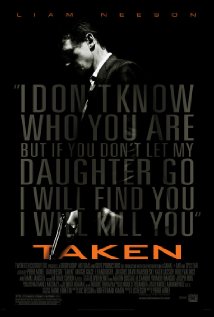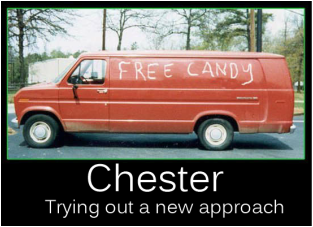Now that Taken 3 is released and raking in the box office profits, I think this is a good time to revisit the premise of the Taken series. How well did Taken actually represent the reality of sex trafficking? (I’ll give you a clue: not well at all.)
(If you haven’t seen Taken, Taken 2, or Taken 3, be warned – here be spoilers.)
Here’s a description of the premise:
In the original Taken (2008), a wealthy 17-year-old white girl on vacation with a friend in Paris meets a handsome young man who offers to share a cab from the airport. He turns out to be part of an Albanian gang and tells his fellow gang members where she’s staying. She is violently kidnapped, kept in a drug-induced stupor, and sold as a permanent sex slave at a very fancy auction. Her father, who just so happens to be a retired CIA agent, (and who was on the phone with her during the kidnapping, conveniently) uses his considerable skills to find his daughter, brutalizing and torturing his way through Europe.
(If you haven’t seen Taken, Taken 2, or Taken 3, be warned – here be spoilers.)
Here’s a description of the premise:
In the original Taken (2008), a wealthy 17-year-old white girl on vacation with a friend in Paris meets a handsome young man who offers to share a cab from the airport. He turns out to be part of an Albanian gang and tells his fellow gang members where she’s staying. She is violently kidnapped, kept in a drug-induced stupor, and sold as a permanent sex slave at a very fancy auction. Her father, who just so happens to be a retired CIA agent, (and who was on the phone with her during the kidnapping, conveniently) uses his considerable skills to find his daughter, brutalizing and torturing his way through Europe.
So let’s talk about some of these details:
1. She’s a wealthy white girl.
Traffickers prey on the vulnerable, and most often the vulnerable are socioeconomically disadvantaged, come from minority populations, are in some way disenfranchised (homeless, runaway, in foster care, etc.), and/or have mental or physical disabilities. The girl in the movie has none of those vulnerabilities. Of course, sex trafficking can happen to anyone. Given the right circumstances, traffickers will take advantage of whomever they can. All I’m saying is, the movie doesn't represent the typical scenario. The film is flashy and intense; sex trafficking is insidious and manipulative.
2: She meets a handsome young man who gets information from her and passes it along to his fellow gang members.
This is totally true. Traffickers aren't always sketchy old dudes with vans; in fact, they rarely are. And even the ones who are, their game is manipulation. Traffickers know young women are more likely to talk to handsome, charming young men. They know how to appeal to a person’s particular insecurities and vulnerabilities.
1. She’s a wealthy white girl.
Traffickers prey on the vulnerable, and most often the vulnerable are socioeconomically disadvantaged, come from minority populations, are in some way disenfranchised (homeless, runaway, in foster care, etc.), and/or have mental or physical disabilities. The girl in the movie has none of those vulnerabilities. Of course, sex trafficking can happen to anyone. Given the right circumstances, traffickers will take advantage of whomever they can. All I’m saying is, the movie doesn't represent the typical scenario. The film is flashy and intense; sex trafficking is insidious and manipulative.
2: She meets a handsome young man who gets information from her and passes it along to his fellow gang members.
This is totally true. Traffickers aren't always sketchy old dudes with vans; in fact, they rarely are. And even the ones who are, their game is manipulation. Traffickers know young women are more likely to talk to handsome, charming young men. They know how to appeal to a person’s particular insecurities and vulnerabilities.
(In Taken 2, the father of one of the kidnappers he killed takes Badass Dad and his wife hostage. In Taken 3, the wife is murdered, and Badass Dad is framed for it. Trite action movie premises aside, we’re going to focus on Taken 1.)
They also know that you can catch more flies with honey, which brings me to my next point…
3: She’s violently kidnapped.
This is really quite rare. First of all, kidnapping is a crime of its own and traffickers try to keep their hands clean. They’re far more likely to manipulate people into coming with them willingly (at least at first). That way, if it comes to a legal scenario, they might be able to talk their way out of it. “It was consensual!”
Second, if you kidnap someone violently, you have to control them violently – tie them up, drug them, beat them into submission, etc. If you charm someone into falling in love with you, then they’re putty in your hands.
It is a horrible truth that it’s much easier to control someone when their feelings are involved, especially when that someone is a teenager. It’s disgusting, but that’s how it works.
4: She’s kept in a drug-induced stupor.
This depends on the situation, but let’s be real: drugs aren't cheap. If traffickers can control someone using less expensive means (again, like manipulation), they will. (And they’ll sell the drugs instead. It’s all about the moolah.)
3: She’s violently kidnapped.
This is really quite rare. First of all, kidnapping is a crime of its own and traffickers try to keep their hands clean. They’re far more likely to manipulate people into coming with them willingly (at least at first). That way, if it comes to a legal scenario, they might be able to talk their way out of it. “It was consensual!”
Second, if you kidnap someone violently, you have to control them violently – tie them up, drug them, beat them into submission, etc. If you charm someone into falling in love with you, then they’re putty in your hands.
It is a horrible truth that it’s much easier to control someone when their feelings are involved, especially when that someone is a teenager. It’s disgusting, but that’s how it works.
4: She’s kept in a drug-induced stupor.
This depends on the situation, but let’s be real: drugs aren't cheap. If traffickers can control someone using less expensive means (again, like manipulation), they will. (And they’ll sell the drugs instead. It’s all about the moolah.)
5: She’s sold at auction as a permanent sex slave.
This is rare. Traffickers see their victims as money-making assets. You can sell the same person a lot of times and keep making money from them. Selling them once and letting them go decreases a trafficker’s ability to make a profit.
6: Her father happens to be a retired CIA agent.
Sure, this is kinda fun for an action movie premise, but it bears no relationship to real life. More importantly, I want to address a subtle danger here: this gives the impression that anyone with the right combination of determination and badass-ery can just go storming in and rescue people. Let me be perfectly clear: that is extremely dangerous. Not only for the one doing the storming, but also for the people under that trafficker’s control. Traffickers are powerful, dangerous people. They’re very attached to their money and they have no scruples about dealing with people who get in their way. It’s best to gather information and give it to authorities who know how to handle it safely. This is not the time or the place to be an action hero.
The bottom line is this: Taken is a cool action movie that bears little to no resemblance to the everyday reality of sex trafficking. It’s given a lot of people the wrong impressions and, as fun as it is that Liam Neeson gets to be an action hero now, those wrong impressions are pretty damaging to actual anti-trafficking efforts. It’s important to separate fact from fiction and approach the problem in a realistic and meaningful way. Because life isn't Hollywood and we aren't action heroes.
Rachel Boyce
Director of Operations
PS: If you’d like some more facts about sex trafficking, check out this useful infographic. The sources it lists at the bottom are also good places to go for more info.
Update:
PPS: Thanks to my friend Ryan for asking this question: what about the brutality? Yes, depending on the disposition of their trafficker(s), sex trafficking victims can be brutally beaten. If you want to learn more about this (warning: difficult subject matter ahead!), Google the term "gorilla pimp."
This is rare. Traffickers see their victims as money-making assets. You can sell the same person a lot of times and keep making money from them. Selling them once and letting them go decreases a trafficker’s ability to make a profit.
6: Her father happens to be a retired CIA agent.
Sure, this is kinda fun for an action movie premise, but it bears no relationship to real life. More importantly, I want to address a subtle danger here: this gives the impression that anyone with the right combination of determination and badass-ery can just go storming in and rescue people. Let me be perfectly clear: that is extremely dangerous. Not only for the one doing the storming, but also for the people under that trafficker’s control. Traffickers are powerful, dangerous people. They’re very attached to their money and they have no scruples about dealing with people who get in their way. It’s best to gather information and give it to authorities who know how to handle it safely. This is not the time or the place to be an action hero.
The bottom line is this: Taken is a cool action movie that bears little to no resemblance to the everyday reality of sex trafficking. It’s given a lot of people the wrong impressions and, as fun as it is that Liam Neeson gets to be an action hero now, those wrong impressions are pretty damaging to actual anti-trafficking efforts. It’s important to separate fact from fiction and approach the problem in a realistic and meaningful way. Because life isn't Hollywood and we aren't action heroes.
Rachel Boyce
Director of Operations
PS: If you’d like some more facts about sex trafficking, check out this useful infographic. The sources it lists at the bottom are also good places to go for more info.
Update:
PPS: Thanks to my friend Ryan for asking this question: what about the brutality? Yes, depending on the disposition of their trafficker(s), sex trafficking victims can be brutally beaten. If you want to learn more about this (warning: difficult subject matter ahead!), Google the term "gorilla pimp."





 RSS Feed
RSS Feed
